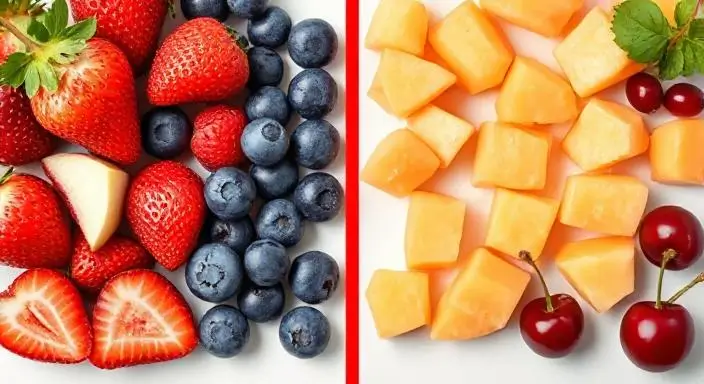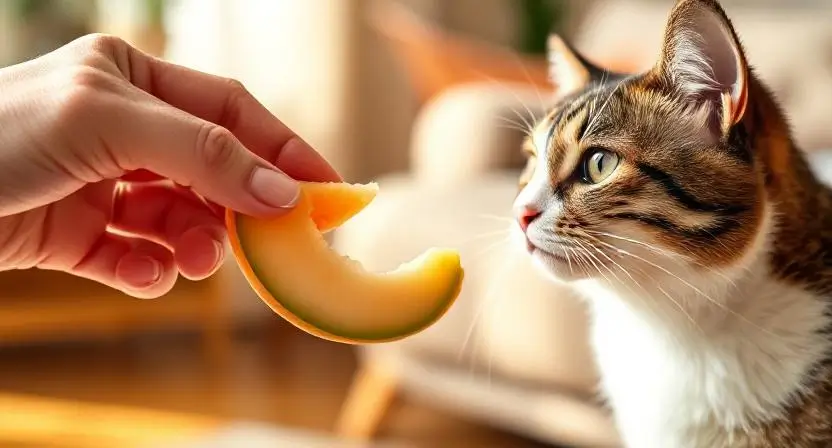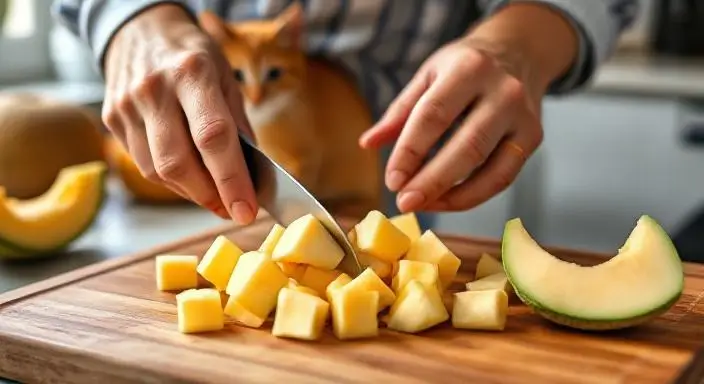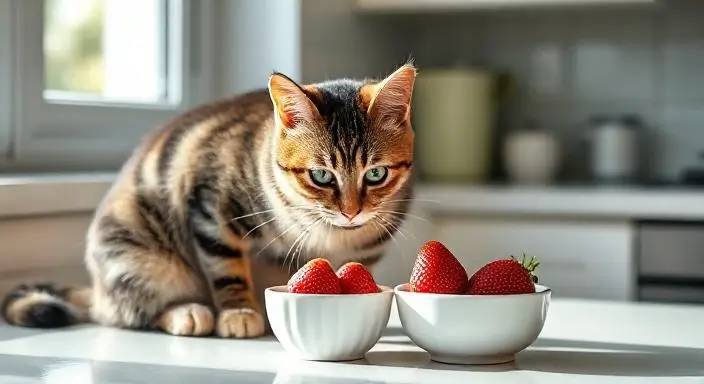What Fruits Can Cats Eat? Safe & Tasty Picks for Felines
what fruits can cats eat ?
Have you ever caught your feline friend curiously pawing at your fruit bowl or giving those strawberries on your plate a suspicious sniff? As devoted cat parents, we naturally wonder whether sharing our favorite fruits with our furry companions is safe or potentially harmful. While your cat’s carnivorous nature means they primarily need meat in their diet, certain fruits can offer enjoyable occasional treats that add variety to their routine.
Table of Contents
In this comprehensive guide, we’ll explore which fruits are safe for your whiskered companion, with special attention to popular options like strawberries and cantaloupe. You’ll discover not only what fruits cats can safely eat but also how to properly prepare them and recognize which fruits should never make their way into your cat’s bowl.
Understanding Your Cat’s Dietary Needs
Cats as Obligate Carnivores
Before we dive into which fruits are cat-friendly, it’s important to understand that cats are obligate carnivores. This means their bodies are designed to derive nutrition primarily from animal proteins. Most cats will naturally turn their nose up at fruit offerings, partly because they lack the taste receptors for sweet flavors that humans enjoy.
Why Cats Don’t Crave Sweets
Unlike humans who might reach for fruit to satisfy a sweet tooth, cats don’t experience sweetness the same way we do. They lack sweet taste receptors, so if your cat does show interest in fruits, it’s likely because of their texture or aroma rather than their sweet taste.
The Role of Treats in Your Cat’s Diet
When considering adding fruits to your cat’s diet, remember that they should be treated as exactly that – treats. All treats combined should make up no more than 10% of your cat’s daily food intake. The remaining 90% should come from nutritionally complete cat food that meets their protein requirements.
Safe Fruits for Cats: The Complete List

Berries Your Cat Can Enjoy
Several types of berries are safe for feline consumption in small amounts, including blueberries, blackberries, raspberries, and strawberries. These colorful fruits can provide variety in your cat’s treat rotation.
Strawberries – A Popular Choice
Strawberries make a particularly good option as they’re an excellent source of potassium and fiber. They also contain vitamin C, B1, B6, antioxidants, and folate – nutrients that can help boost your cat’s immune system.
Yes, cats can safely eat strawberries in small amounts. However, while they aren’t toxic, they’re not exactly a feline superfood. Cats are built to thrive on animal-based proteins, not fruits.
That said, strawberries offer several potential benefits when fed in moderation:
- They contain important nutrients like vitamin C, folate, and potassium
- They’re rich in fiber, which may aid digestion
- They contain antioxidants that help combat inflammation
- Their high water content provides a small hydration boost
Blueberries – Tiny Nutritional Powerhouses
Blueberries pack an impressive nutritional punch with vitamins A, C, K, E, and beneficial plant compounds called flavonoids. Often considered “superfoods,” these tiny berries contain higher levels of antioxidants than many other fruits, potentially supporting eye health and offering anti-inflammatory benefits. As a bonus, they’re relatively low in calories.
Raspberries – Anti-Inflammatory Benefits
Raspberries are full of vitamin C, potassium, and fiber – nutrients that can strengthen your cat’s immune system. These red berries are not only rich in dietary fiber and low in sugar but also offer anti-inflammatory properties, making them particularly beneficial for older cats with joint issues.
One note of caution: raspberries contain small amounts of xylitol, a natural sweetener that can be harmful to pets in large quantities. Fortunately, the amount in raspberries is negligible, so when given occasionally and in small amounts, they should cause no harm.
Melons – Hydrating Treats

Cantaloupe – A Feline Favorite
Interestingly, cantaloupe often proves irresistible to cats because its scent mimics the smell of proteins found in meat. This cat-approved melon is relatively low in calories while providing vitamin C, beta carotene, fiber, and antioxidants that support immune function and can contribute to healthy skin and coat.
To serve cantaloupe safely, cut a small piece into tiny cubes and always remove the rind before offering it to your cat.
Watermelon – Summer Refreshment
On hot summer days, a small portion of watermelon flesh can be a refreshing treat for your cat. This hydrating fruit contains vitamins A and C while being mostly water – perfect for encouraging hydration in cats who might not drink enough from their water bowl.
Other Safe Fruits for Feline Consumption
Apples – Crisp and Nutritious
Cats can enjoy apples in moderation, preferably peeled and cut into small pieces. For easier digestion, some pet parents opt for peeled and boiled apples, though it’s important to avoid cooked apples with added ingredients like sugar. Dried apples should be avoided due to their concentrated sugar content.
While apple flesh is safe, remember that stems, leaves, and seeds contain cyanide, which is poisonous to cats. Always remove these parts before offering apple to your feline friend. As veterinarian Dr. Fox advises, “I recommend cutting up the fruit into small pieces and not giving them things with pits or seeds inside that could be choking hazards or cause an intestinal obstruction if swallowed.”
Bananas – Potassium-Rich Treats
Cats require potassium for good health, and deficiencies can lead to problems like lethargy, weight loss, and muscle weakness. While a balanced cat food should provide all the potassium your cat needs, bananas can offer a supplementary boost when appropriate. Remember that moderation is key – a small portion of banana is sufficient to satisfy your cat’s snacking urge while supporting their health.
Pears – Fiber and Vitamin Benefits
Pears offer your cat beneficial fiber, vitamin C, and potassium. These nutrients can support digestive health and help boost your cat’s immune system when offered as an occasional treat.
Fruits Cats Should Avoid
Toxic Fruits That Can Harm Your Cat
While several fruits are safe for feline consumption, others pose serious health risks. Grapes and raisins top the list of dangerous fruits for cats – even small amounts can cause severe reactions and potentially lead to kidney failure. Other fruits to avoid include:
- Citrus fruits (lemons, limes, oranges, grapefruit)
- Cherries
- Wild berries (unless you’re certain of their safety)
- Avocados
Signs of Fruit Toxicity in Cats
If your cat accidentally consumes any unsafe fruit, quick action is crucial. Watch for warning signs including vomiting, diarrhea, lethargy, or behavioral changes. Should you notice these symptoms or if your cat ingests a significant amount of toxic fruit, contact your veterinarian or the Pet Poison Helpline (855-764-7661; fee applies) immediately for guidance tailored to your specific situation.
Best Practices for Feeding Fruits to Cats

Proper Preparation Techniques
To safely serve fruit to your cat:
- Thoroughly wash all fresh fruits before offering them
- Remove stems, seeds, pits, and rinds – these parts can be toxic, present choking hazards, or cause digestive issues
- Cut fruit into small, bite-sized pieces that your cat can easily manage
Portion Control and Frequency
Remember that fruits should be occasional treats, not dietary staples. All treats combined should make up no more than 10% of your cat’s daily food intake. When selecting frozen or canned fruits, choose options without added sugars, preservatives, or ingredients that could harm your cat.
Introducing New Fruits to Your Cat’s Diet
When introducing fruits to your cat:
- Always prioritize a balanced diet and consult your veterinarian before adding new foods
- Fresh fruit is generally preferable to canned or processed options that may contain harmful additives
- Start with tiny amounts of any new food and monitor for adverse reactions like vomiting, diarrhea, or skin rashes
Special Considerations for Different Cats
Kittens and Fruit Consumption
Kittens have particularly sensitive, developing digestive systems. While a very small amount of safe fruit probably won’t cause harm, it’s especially important not to overdo it with young cats whose digestive tracts are still maturing.
Senior Cats and Digestive Sensitivities
As cats age, their nutritional needs and digestive capabilities change. Some fruits, like raspberries, offer anti-inflammatory properties that may particularly benefit older cats dealing with age-related inflammation.
Cats with Health Conditions
Always consult with your veterinarian before introducing any new foods to cats with existing health conditions. What works well for one cat might be problematic for another, depending on factors like age, health history, and current diet. Cats on prescription diets should only receive foods approved by their veterinarian.
Conclusion: Fruity Treats in Moderation
While your cat’s ancestors weren’t gathering berries in the wild, modern domestic cats can safely enjoy certain fruits as occasional treats. Strawberries, cantaloupe, blueberries, and other approved fruits can provide variety, hydration, and supplementary nutrients when offered properly and in moderation.
Remember that fruits should never replace your cat’s regular diet of high-quality cat food. When introducing any new food, including fruit, monitor your cat closely for any adverse reactions and consult your veterinarian if you have concerns.
By following the guidelines outlined in this article, you can safely share appropriate fruit treats with your feline companion, enhancing their dietary experience while maintaining their optimal health and nutrition.
Your Next Steps
Are you ready to introduce some cat-safe fruits into your feline friend’s treat rotation? Start small with a tiny piece of strawberry or cantaloupe and observe your cat’s reaction. Remember to properly prepare all fruits by washing thoroughly and removing seeds, pits, and rinds.
Have you discovered your cat has a particular fondness for certain fruits? Or perhaps you have questions about other foods your cat can safely enjoy? Consult with your veterinarian about your cat’s specific dietary needs and restrictions to ensure you’re providing the best possible nutrition for your beloved pet.

